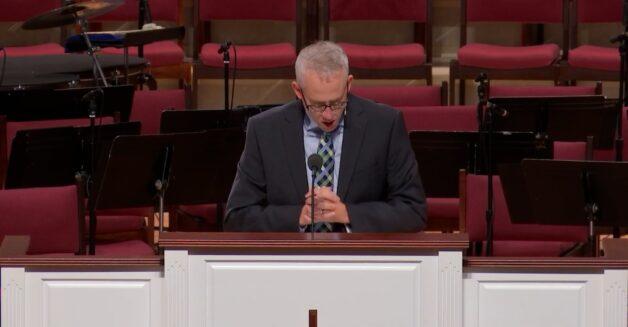 Whatever lasting impact John Calvin has had on the church of Jesus Christ, and on the whole world for that matter, is owing to his commitment to understanding and explaining the word of God. From sermons to lectures to letters to tracts to treatises to confessions to catechisms to books, his adult life was consumed with one thing: the word of God–the word as a summons to obedience, the word as a blueprint for reform, the word as the foundation for all truth.
Whatever lasting impact John Calvin has had on the church of Jesus Christ, and on the whole world for that matter, is owing to his commitment to understanding and explaining the word of God. From sermons to lectures to letters to tracts to treatises to confessions to catechisms to books, his adult life was consumed with one thing: the word of God–the word as a summons to obedience, the word as a blueprint for reform, the word as the foundation for all truth.
Calvin’s confidence was not in the world of technology and progress. He would have scoffed at Bultmann’s now laughable line from several generations ago that “it is impossible to use electric light and the wireless [radio] and to avail ourselves of modern medical and surgical discoveries, and at the same time believe in the New Testament world of demons and spirits.”
Calvin’s confidence was not in man’s potential or the triumph of the human spirit. He would have equally scoffed and been frankly embarrassed by the well-known Reformed Church pastor, Robert Schuller who argued that self-esteem was the New Reformation and that “Christians should hold to these truths: I affirm that I will never be defeated, because I will never quit…I affirm that if I’m totally dedicated I’ll eventually win.”
Calvin’s confidence was in the Word of God, and that’s why his theology and vision of the world continues to capture the minds and hearts of people in the 21st century. That’s why five hundred years later we remember his birth. That’s why Calvin the preacher and expositor has millions more spiritual children than Erasmus the scholar and hermeneutical skeptic. Strive for relevance in your day, and you’ll may make a difference for a few years. Anchor yourself in what is eternal and you may influence the world for another five centuries.
I’m all for young people dreaming big dreams. Go out and change the world. Make a difference. Discover a cure for cancer. Write a best-selling novel. Become president. But remember, your “glory” (and mine) will not last. Your great accomplishments will fall away–either in your lifetime, or in a generation, or at the end of all things.
No one will care about your GPA and SAT scores in ten years. If you win a state championship, you’ll be forgotten the next year you don’t. Your beauty will get wrinkles and trim figure plump. Write a great book and it will gather dust in a library some day. Have a big famous church, it won’t last forever. Be an important person in your field, you still be unknown to over 6 billion people in the world. Build an amazing house, it will crumble some day, if it doesn’t go into foreclosure first. All of our achievements and successes are destined to be like dead grass and faded flowers.
But…the word of our God stands forever. The word about Babylon in Isaiah 40 stood firm. and so will his word in our generation. All God’s declarations about himself and his people are true. All his promises will come to pass. Our only confidence is in the word of God. John Calvin was a man, an imperfect, sinful man, but a man that God used enormously because he put his confidence in the word of God.
We do the memory of Calvin no disservice to admit that he had weaknesses. He was physically frail and could be emotionally volatile. No one lamented his own weaknesses–physical and spiritual–more than himself. And no one understand general human weakness better than Calvin. The universe of Calvin’s thought was one where man was small and God was very big. He had no problem being thought of as dust, or a worm, or grass, because he knew that’s what he was compared to the infinite glory, splendor, and holiness of a sovereign God. In a culture like ours where everyone has their thing, their schtick, it’s worth remembering that Calvin’s thing was always the word of God and the glorious God he met there.
God’s promises are sure and his declarations are always right. Opinion polls will come and go. Focus groups can say what they want. Pundits will wax eloquent on everything under the sun. God’s word will still be true. The word is our compass pointing us in the right direction. It’s the North Star, fixed and firm. We may wander and waver, but the word will remain. It’s like a stately evergreen in a field of grass and tulips. The grass will get green. The tulips will have their day. But the evergreen alone will survive the winter. It will not be moved. Humans are weak, failing, and temporal. The word is strong, abiding, eternal.
This is one of the great paradoxes of life. We all want significance. We all want affirmation. We all want to leave a legacy. Some seek significance in work, some in performance, others in stuff, a lot of people in family. Yet, we all have a God-given sense that for all our bluster and bravado we are still grass. But we all want to bloom. So we pour our lives into degrees, and professional advancement, into ministry, and business, and houses, and kids. All the while, knowing deep down that life is fleeting and passing us by and we desperately need to take hold of something that is eternal.
This is the paradox of permanence. The only way our lives will ever touch that which is eternal is to admit that our lives are hopelessly temporal. John Oswalt in his commentary on Isaiah remarked, “If I insist I am permanent, then I become nothing; if I admit that God alone is permanent, then he breathes his permanence on me.” You want a legacy? You want to transcend your own meager existence? Let go of your vain supposed success and grab hold of the word of our God. “This is the one I esteem,” says the Lord, “he who is humble and contrite in spirit, and trembles at my word” (Isa. 66:2).
The truly significant people in this world know that God is everything and they’re nothing. Fads and fashions will rise and fall, but the word will keep on accomplishing its purposes. It will outlast us all. So let our reading, memorizing, catechizing, and preaching be saturated with the word. Let our songs, ministries and mission submit to the word. May all of our theological questions, relationship questions, family questions look to the word. May every new doctrine, new movement, new church, and new book be tested against the word. May all our living and dying be undertaken with the firm conviction that God is true though everyone were a liar (Rom. 3:4).
God’s word is smarter, clearer, truer, and speaks to people’s deepest needs more than you and I ever could. So try thinking a few less original thoughts and people just might find you relevant in 500 years. “A voice say, Cry out. And I said, What shall I cry? All men are like grass, and all their glory is like the flowers of the field. The grass withers and the flowers fall, because the breath of the Lord blows on them. Surely the people are grass. The grass withers and the flowers fall, but the word of our God stands forever” (Isa. 40:6-8).


